
A shining example from our Humor Issue, here’s an essay about rude puppets (and love, and death). You can order the magazine, or subscribe here.
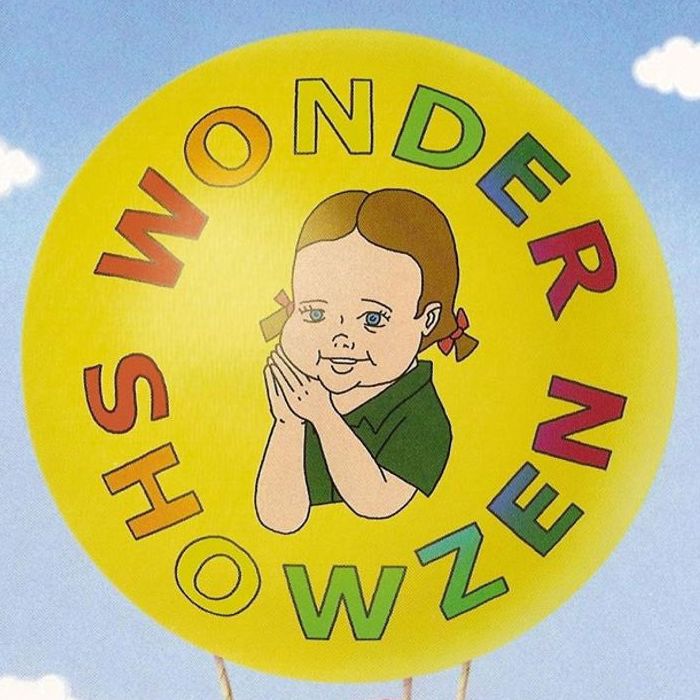 The most inappropriate show that has ever aired in the history of TV is Wonder Showzen. It’s amazing that the show survived MTV2 for two whole seasons, from 2005 to 2006. Even the creators, Vernon Chatman and John Lee, now speak about that time in disbelief. As time went on, their sketches picked up more and more furious energy as they attempted to “get away with as much as possible before being canceled.”
The most inappropriate show that has ever aired in the history of TV is Wonder Showzen. It’s amazing that the show survived MTV2 for two whole seasons, from 2005 to 2006. Even the creators, Vernon Chatman and John Lee, now speak about that time in disbelief. As time went on, their sketches picked up more and more furious energy as they attempted to “get away with as much as possible before being canceled.”
Wonder Showzen is a variety show of puppetry, cartoons, faux commercials, and live action interview sketches. Puppets Chauncey, Clarence, and the rest of the gang terrorize each other in a bizarro evil Sesame Street world. The show’s opening credits ask viewers to please mind the children: “Wonder Showzen contains offensive, despicable content that is too controversial and too awesome for actual children… If you allow a child to watch this show, you are a bad parent or guardian.”
The show is about pushing dark humor to its limits. Clarence’s man-on-the-street segments accost New Yorkers with annoying stunts, as the puppet pushes its mic and its face against someone while asking, “How do you feel about personal space?” Usually the interviewees snap and unwittingly make good TV.
Wonder Showzen is also rooted in the deep frustrations about our society’s inability to grapple with its own history. Taboos are flayed, then drawn and quartered, then skewered—just to make sure they’re good and dead. In a recurring segment called “Beat Kids,” eight-year-olds approach workers on their lunch breaks and ask them unsettling questions. “Who did you exploit today?” a cute girl in pigtails asks besuited men and women walking around Wall Street. A grinning red-haired boy marches around Judiciary Square in an SS uniform and a stick-on mustache. He asks people, “What is wrong with the youth of today?” The Anti-Defamation League called up MTV after that episode.

“I’m out here, tryin’ to get people to accept Jesus!” Clarence says, introducing a sketch in the middle of Stuyvesant Park, where his man-on-the-street segments are most often filmed. It’s a quiet but big city park, with a huge amount of bench real estate. And notably, there is little to no police presence at any given time. This makes Stuyvesant Park a prime spot for tired, jaded New Yorkers to absolutely lose it in their interviews with this annoying puppet.
Looming large in the background of these scenes is my own parish church, St. George’s.
While I was drawn to New York to immerse myself in the culture, the media and music, I mostly moved to the city for this church. It’s a place where I’ve talked with the city’s very rich and very poor over Styrofoam cups of coffee. It’s where I come back each week to sit in the historic pews and hear the same, simple message of the Gospel, and wonder how St. George’s has managed to be such a constant, proven place of rest. The paranormal pull towards this church has been my closest encounter with the Spirit in action (and I’ve been to an Alpha conference!). Since my mother passed away suddenly two years ago, it’s sometimes felt like the only home I have left.
“Will you accept Jesus into your heart?” Clarence asks a man trying to enjoy a cigarette in Stuyvesant Park. Yelling “Keep it away!” the man swings his medical cane at the puppet. (Who knows how long the film crew had been standing there, asking and asking the same question.)
“Will you accept Jesus into your heart?” Clarence asks another man in his high-pitched puppet voice.
“Yeah sure. He’s already in there.” This one’s got a cap and sunglasses on, but he’s willing to play the game.
“You know when we’re up in heaven, we’re not gonna need clothes anymore.”
“Will I get to see all my relatives that died?”
“Yeah, we’re gonna see ’em all naked,” the puppet says.
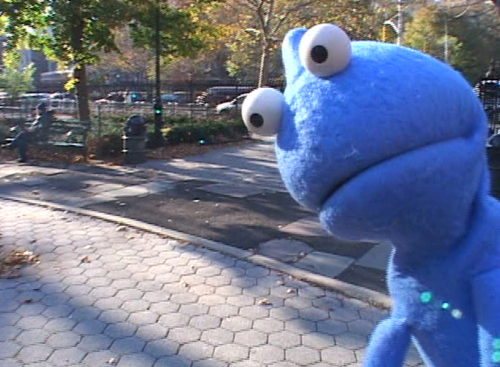
The man’s sincere question about his family would have gone over my head before tragedy hit my life. What once seemed generic—will I get to see my family in heaven?—now wakes me up. I’d like to know, too! I’d like to talk to him about what experience he had, and who he’s lost.
Dark humor might come from sincere attempts to expose, even ameliorate, sin and suffering. But it isn’t always harmless. So is there any good news in dark humor?
There are a ton of Jesus references throughout Wonder Showzen. The writers seem to be obsessed with upending the righteousness of God, almost like a challenge to the viewer, or to God.
In a quick interstitial, the camera frames a young girl in a 1950s-style dress penning a letter to Jesus. “Dear Jesus, once you get this note, throw it in the garbage. Because at least the garbage is real. Stay real, garbage head.”
In a cartoon sketch, an anthropomorphized Bible (the Gnostic Gospels’ walking, talking Cross, maybe?) tells a young boy not to drink beer, take heroin, or carry a knife. “It will upset you!” the big Bible warns. To save the young boy and prove his point, the Bible itself takes the beer, drugs, and knife. For some reason, the Bible yells, “Go Gators! Go Gators!” and then heads to Cabo in a trail of drunken destruction.
Wonder Showzen attempted to air a sketch with someone firing a real shotgun at a crucifix, but MTV nixed it for being too insensitive. “It’s the cross’s fault. He should have warned us,” the writers said, casually evolving the unaired segment about religion into one about police shootings.
In another, Chauncey plays Rock-Paper-Scissors with God for the fate of the Earth. God plays scissors, and Chauncey beats him with rock, so God has to submit and restore Earth. “Thanks God, you’re the greatest!” Chauncey says. “…Greatest loser!” God then kills himself in shame at losing Rock-Paper-Scissors, and the puppets feast on what look like oversized turkey legs (fresh God meat).
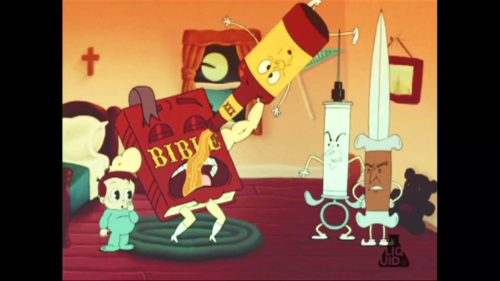
Woody Allen’s Crimes and Misdemeanors takes a stab at why dark humor works. “The thing you gotta remember about comedy is, if it bends, it’s funny, if it breaks, it’s not funny,” the smarmy TV producer Lester, played by Alan Alda, says to the camera. (This was an actual quote from Larry Gelbart, creator of M.A.S.H., who worked with Alda on that show for many years.) “Comedy is tragedy plus time…” Moments after Abraham Lincoln was shot, Lester explains, the topic was off-limits for a joke. But after a few years, go for it.
Haha! Take that, Abe. Ya basic! Lester’s Abraham Lincoln example comes out sounding totally crass—it breaks, if you will. If you try to explain comedy, the film argues, the joke’s on you. But there’s no denying the connection between tragedy and comedy. And so what is dark humor if not a deep cry of anger, frustration, and sadness?
“Can I do an impression of you?” the red-haired Beat Kids interviewer (named Trevor Heins) asks an elderly man sitting in the stands of a race track. “Gamble, gamble, gamble—die.” The man laughs nervously and admits his gambling is a bad habit.
The show cuts to a song with kids dancing in front of a green screen, with the pyramids, the Parthenon, and Mount Rushmore flashing behind them—it’s an ode to slaves for all their hard work. “Slaves! Built the pyramids… Slaves! Built the Parthenon… Slaves! Built America… Slaves, this is your song, thank you.”
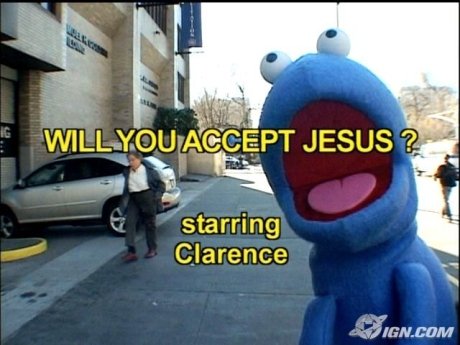
I’ve always been drawn to dark humor as a way to, you know, deal. One year I wrapped all of my family’s Christmas presents in overdue student loan bills. Yes, any desire to build a career or a marriage or a family lay under this teetering mountain of a hundred thousand dollars of debt. My cousin’s girlfriend was reminded of this as she unwrapped the Brooklyn Industries T-shirt I got her.
“So funny. Funny girl,” my aunt said, in a flat tone that didn’t actually sound amused. “You can’t keep up with your payments?”
It was sad.
In Romans 5, Paul says that because of Jesus’ death on the cross, we are free, we are at peace with God, we may even “boast” in our sadness and our suffering:
We boast in our hope of sharing the glory of God…and not only that, but we also boast in our sufferings, knowing that suffering produces endurance, and endurance produces character, and character produces hope, and hope does not disappoint us, because God’s love has been poured into our hearts through the Holy Spirit that has been given to us.
The rector at our church preached from this passage last year on Father’s Day. It’s probably a rough calendar day for many, he said. You might not have a great father, or you might not be a great father. (Way to crush everyone’s Father’s Day jazz brunch buzz.) But, he said, in light of Romans 5, it’s always a day of celebration, because of the substitution of Jesus’s life for our own.
This message has greater consequences than any of Wonder Showzen’s taboo-flaying sketches, because it turns the interrogation lamp around. For all my good intentions, social graces, hard work—and even though I was recruited to row at an Ivy League school, but then quit after the minimum one year’s commitment to do what I really wanted to do: nap over my Classics texts in the library, steal bottles of grain alcohol from frat parties, mope, smoke too many cigarettes, and watch Wonder Showzen—for all my hard work at being me, I am not sufficient.
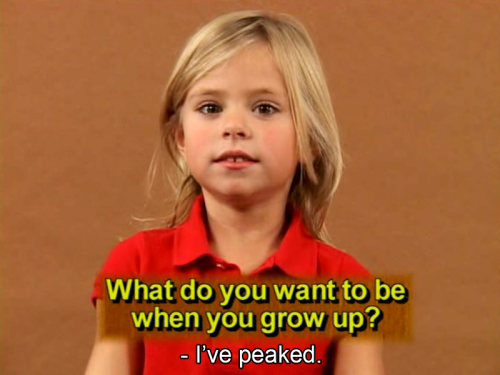
And, in crawling through the grief after my mother’s death, I can’t say I have been “boasting” much. It’s been a groggy mess: an extreme, never-ending silence, a taste of absolute loneliness, a consistent, paralyzing fear of losing memory after memory of my mom. Oh, and the stuff—the endless supply of objects that had to be reckoned with when emptying a house we’d lived in for twenty years.
My mother passed away four weeks before my wedding. I decided to go through with the party. I’d rather be around friends and family to celebrate her life, than be alone.
And the last thing I wanted to do was go for my third and final wedding dress fitting—alone this time—but I had to pick up the damn thing.
After paying the balance on the service, the seamstress handed me a bridal gift bag: a piece of Dove chocolate, a 10% off coupon for wedding dress dry cleaning, and a red foam stress ball—because you know, brides just get sooooo stressed!
Our wedding was held in the Chapel at St. George’s. Musicians played music by both Harry Burleigh and Anton Dvorak, reputed congregants of St. George’s in the turn of the last century, and we later danced to as much New Wave music as the ill-chosen DJ agreed to play. (“Welcome to Miami” was definitely on the no-play list, and then, there it was, taunting me through the speakers that I had rented…) The caterers even wore humiliating pink bowties in a nod to the short-lived Starz sitcom, Party Down. How lucky I was to sit at the front of this church, getting married in front of all my family and friends, surrounded by such history, beauty, and subtle Party Down references. And yet, the one person I needed there more than my new husband was not. In fact, she was gone forever. The scene seemed a crushing reminder that there is no such thing as a “perfect day” in this life.

The creators of Wonder Showzen (production company PFFR, comprised of Vernon Chatman, John Lee, Alyson Levy, and Jim Tozzi) are also behind many of the darkest cult-comedies on TV: South Park, Louie, Delocated, almost all of which have created their own media scandals for pushing the limits of offense.
In 2003, the company produced a 22-minute documentary directed by Levy, The Hands of God, featuring interviews with church members in the midst of a puppetry competition.
The short movie opens with a stage full of puppets maneuvering to altered lyrics in the tune of Don McLean’s “American Pie.” “A long, long time ago…Jesus told his disciples, don’t be troubled, trust in me… He’s building mansions way up there, and there’s many more, that he’ll prepare…someday, for you and meeeee.”
Later in the doc, a husband and wife duo stand in front of a stained-glass window. “When my husband passed away, the Lord took him away and left me behind. I felt lost and separated, without a purpose in life. Then the Lord sent Bruce my way, a fine Christian man just like David was… We were in the chapel here, after I’d been through deep grief, and the Holy Spirit touched my life and gave me the ability to do ventriloquism.” The camera cuts to them on stage, performing Biblical stories with their puppets.
Two teenage girls talk about how well their break dancing was received. “We prayed for mad skills! Please, God, give us something that’s worth watching,” one says, laughing. She continues later, “A lot of people here come from the same types of things that I did…abusive families…different things that children go through, like being molested…I hear them say that is the thing that they wish they could change about their life, but I do not feel that way. I know that I went through these things for a reason and I’m glad that I did, because I wouldn’t have a story. I wouldn’t be able to help anyone who’s been through these situations, had I not.” Yikes—what a confession!
I reached out to PFFR to ask if there was a connection between this church’s puppets and the ones they created for Wonder Showzen. “Did you originally find the church through a shared love of puppetry craft?” I asked. “Would love to know the story.”
“No connection. No love of puppetry craft. [Hands of God] was a discovery of a Christian Puppetry Competition. We got permission to film there and made a little doc. We ignored the competition and focused on the relationship of people with puppets. But maybe you see something we don’t.”
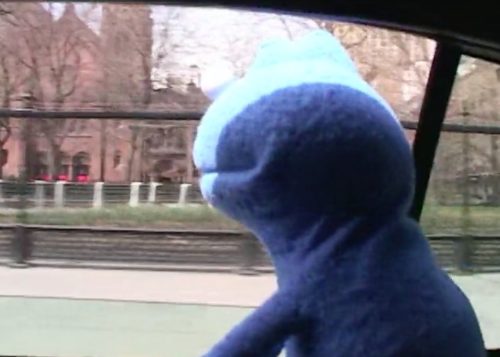
Clarence the puppet overlooking St. George in the background.
No love of puppetry craft? Coming from the creators of a show centered on a handful of puppets, I found such a specific and extreme denial pretty curious. But I did appreciate their earnestness, as the documentary lets these people’s stories be told through such a weird, meek device as a Christian Puppetry Competition. Through the lens of The Hands of God, the parishioners’ joy shines through in their songs, and in their ventriloquism—even in the face of really tough lives lived.
I replied back that I loved the documentary, and attached a picture of my two cats, Clarence and Chauncey, named after their original puppet characters.
“Thanks,” PFFR replied. “That world is so odd and perfect we almost converted.”
SUBSCRIBE TO THE MOCKINGBIRD!

COMMENTS
4 responses to “Depraved Puppetry: Is There Any Good News in Dark Humor?”
Leave a Reply













Thank you Mockingbird! Perfect screenshot choices.
Caroline, so touched by this! So thought-provoking. So well-written. But most of all, so sorry you lost your mom. I didn’t know.
Caroline, thank you so much for this piece. Hilarious & heartfelt in turns. My favorite things.
[…] reminded of Caroline Henley’s excellent article “Depraved Puppetry: Is There Any Good News in Dark Humor?,” published in The Mockingbird magazine. She writes that “there’s no denying the […]